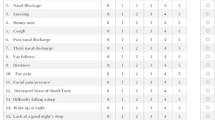Abstract
Nasal polyposis is one of the most common chronic upper airway diseases. Management of allergic rhinosinusitis with polyps is to control the disease process and the local immune response of the nasal mucosa. This is achieved by surgical removal of polypoid mucosa of all sinuses by functional endoscopic sinus surgery (FESS) followed by suppression of local immune response by using steroids. Budesonide nasal douching was introduced recently for postoperative management of patients with allergic rhinosinusitis. The therapeutic effectiveness and safety of this procedure are becoming accepted by many physicians. Evaluation of the efficacy of budesonide nasal irrigation in the postoperative management of chronic allergic rhinosinusitis with polyps. A total of 60 postoperative chronic allergic rhinosinusitis with polyps patients were randomly divided into two groups. Both groups received routine post-FESS medication as per the institute protocol. One group of patients received budesonide nasal douching in addition to regular care. Both groups were evaluated endoscopically at 1, 2, 6 and 10 weeks after surgery. Pre and postoperative quality of life change, the patient complaints, need for revision surgery were evaluated. Endoscopic Lund–Kennedy scoring (objective measurement) and Sino-Nasal Outcome Test-22 (subjective analysis) were used to compare the two postoperative groups. The average preoperative Sino-Nasal Outcome Test 22 score was 52.2. It was reduced to an average of 29.4 in patients who used the standard postoperative regimen and to 15.8 postoperatively in patients who had budesonide added to their douching solutions. The average endoscopy score was 2.2 for patients who did receive budesonide as compared to 2.9 for patients who did not receive budesonide nasal douching. Budesonide nasal douching can offer a safe and effective tool in managing local inflammatory response in allergic rhinosinusitis. It leads to a significantly better quality of life and has an adequate response on nasal mucosa—leading to less mucosal oedema and lower incidence of polypoidal changes postoperatively.
Similar content being viewed by others
References
Shapiro DJ, Hicks LA, Pavia AT, Hersh AL (2014) Antibiotic prescribing for adults in ambulatory care in the USA, 2007–09. J Antimicrob Chemother 69(1):234–240
Kalish LH, Arendts G, Sacks R, Craig JC (2009) Topical steroids in chronic rhinosinusitis without polyps: a systematic review and meta-analysis. Otolaryngol Head Neck Surg 141(6):674–683
Snidvongs K, Pratt E, Chin D, Sacks R, Earls P, Harvey RJ (2012) Corticosteroid [8] nasal irrigations after endoscopic sinus surgery in the management of chronic rhinosinusitis. Int Forum Allergy Rhinol 2(5):415–421
Sachanandani NS, Piccirillo JF, Kramper MA, Thawley SE, Vlahiotis A (2009) The effect of [11] nasally administered budesonide respules on adrenal cortex function in patients with chronic rhinosinusitis. Arch Otolaryngol Head Neck Surg 135(3):303–307
Seiberling KA, Chang DF, Nyirady J, Park F, Church CA (2013) Effect of intranasal [14] budesonide irrigations on intraocular pressure. Int Forum Allergy Rhinol 3(9):704–707
Welch KC, Thaler ER, Doghramji LL, Palmer JN, Chiu AG (2010) The effects of serum [10] and urinary cortisol levels of topical intranasal irrigations with budesonide added to saline in patients with recurrent polyposis after endoscopic sinus surgery. Am J Rhinol Allergy 24(1):26–28
Kalish L, Snidvongs K, Sivasubramaniam R, Cope D, Harvey RJ (2012) Topical steroids for nasal polyps. Cochrane Database Syst Rev 12:CD006549
Rotenberg BW, Zhang I, Arra I, Payton KB (2011) Postoperative care for Samter’s triad patients undergoing endoscopic sinus surgery: a double-blinded, randomised controlled trial. Laryngoscope 121(12):2702–2705
Harvey RJ, Goddard JC, Wise SK, Schlosser RJ (2008) Effects of endoscopic sinus surgery and delivery device on cadaver sinus irrigation. Otolaryngol Head Neck Surg 139(1):137–142
Thomas WWIII, Harvey RJ, Rudmik L, Hwang PH, Schlosser RJ (2013) Distribution of topical agents to the paranasal sinuses: an evidence-based review with recommendations. Artforum Allergy Rhinol 3(9):691–703
Funding
The authors did not receive any funding.
Author information
Authors and Affiliations
Corresponding author
Ethics declarations
Conflict of interest
The authors declare that they have no conflict of interest.
Additional information
Publisher's Note
Springer Nature remains neutral with regard to jurisdictional claims in published maps and institutional affiliations.
Rights and permissions
About this article
Cite this article
Thanneru, M., Lanke, S. & Kolavali, S. The Effectiveness of Budesonide Nasal Irrigation After Endoscopic Sinus Surgery in Chronic Allergic Rhinosinusitis with Polyps. Indian J Otolaryngol Head Neck Surg 72, 350–354 (2020). https://doi.org/10.1007/s12070-020-01878-x
Received:
Accepted:
Published:
Issue Date:
DOI: https://doi.org/10.1007/s12070-020-01878-x




